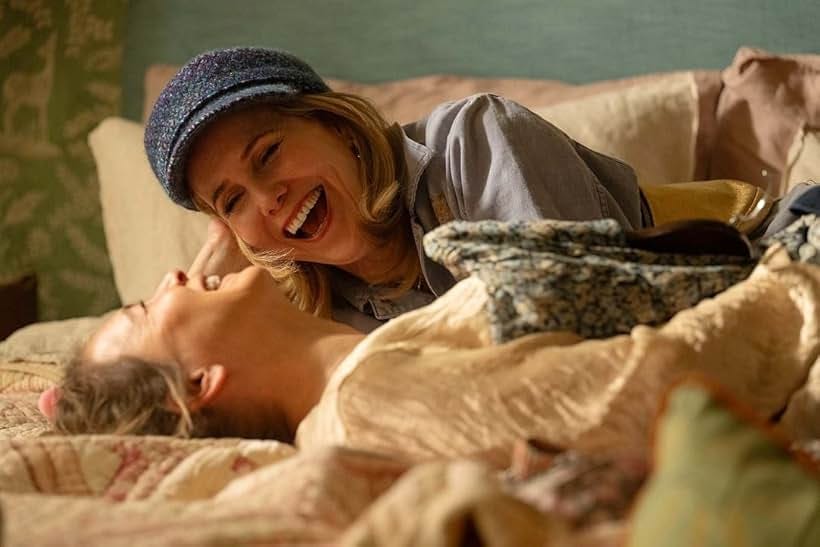Bridget Jones: Mad About The (Messy) Woman
Embracing the mess in life in the name of silver screen heroines and questioning her future in film/TV
What prompts a person to sit well past midnight on Substack with sour strawberry Twizzlers in hand, listening to Olivia Dean and Glass Animals? (My new soundtrack is unlocked.) A very Bridget Jones-esque moment. Only the vodka was missing, although not quite my choice of spirit.
An icon of the 2000s rom-coms, Renee Zellweger’s portrayal of the (slightly Americanised) British female lead has been criticised and praised for her messy 9.5-stone lifestyle. Since the filmatised heroine is adapted from Helen Fielding’s book series, I cannot speak to how accurate or faithful movie-Bridget is. But what I will confess is that I love Bridget Jones.
Since watching the newest sequel Mad About The Boy (number four in the series), I’ve read and heard mixed reviews. The loudest and most recurring critique centres around a few quite valid but perhaps dismissive points:
the predictable and boring plot in a trendy stream of age-gap romances (Babygirl, The Idea of You);
(spoiler alert) the overtaking sob story;
the fallacy that women cannot be happy without a romantic partner.
I am not a film critic, and this is not a movie review, so let’s strike out the dramaturgical aspect of Mad About The Boy and instead focus on the Woman.
((In all honesty, I thought the sob story was handled with grace, and there was enough space and screen time for both comedy and thoughtful reflection. Yes, I did cry. And to the other point, I’d add that having a romantic partner is a choice and option to enhance, multiply and extend happiness to more people. The greatest happiness comes from community and those little je ne sais quoi moments, but I digress.))

What seems to be the red thread in the critique of the franchise is always Bridget herself or how she is known as the awkward and klutzy spinster.
There is something fascinating about the messy woman. The woman that sits alone late at night listening to Chaka Khan as she sulks and reacts to her troubling existence and failing romantic connections. Or the woman whose business and familial relations are hanging by a thread.
Whether Bridget Jones, Fleabag, or a third, entirely different character is your go-to messy woman, the (over)saturation of the trope is undeniable. Good critique of the child-free, sex-deprived, hard-working and – remember this, it’s the important one – unmarried woman covers the underlying precursors for the messy woman and examines how and why she is the way we know her to be.
I’d like to offer something additional to this discussion. Despite her stereotypical messiness, as a twenty-something woman trying to get her shit together there is something comforting in knowing that you can’t and don’t have to be a girlboss to be lovable or happy in life. Once that realisation has settled, then the question arises: Should we embrace the messiness?
Emotional fuckwittage and all that
Before Bridget Jones could ever work and then beautifully quit her London PR job, the expected and best financial option for women was to marry young and raise the kids. In the second wave of feminism from the sixties to early eighties, this changed, and women gaining reproductive rights and financial equality made them independent; they could have both family and work if that was their choice.
Megan Bell writes of the messy woman’s history in Heroica:
“…from this history, the Messy Modern Woman was initially created as a response to historical limitations women have experienced. Yet this trope has now warped powerful women characters into creatures of chaos, further pushing the idea that women can’t have it all.”
Bridget became the zeitgeist icon of messy millennial women when Renee Zellweger first portrayed her in 2001. And now, after four movies and nearly 25 years, she still never had it all. When she had the job, her love-life was failing, and she was fat (we’ve already debunked this, but let’s go with it for the sake of the noughties’ beauty standards. Remember Love Actually? Yeah, they were never really fat.) Then, when she was having a baby, the father was unknown (and born out of wedlock); and when she finally has the family, the love of her life dies.
I’d like to stress that although Bridget Jones is well-written, well-performed, and the original representation of the messy (millennial) woman, she is a fictional character: warped and written in hyperbole for comedic and dramatic intent.
But this is where I believe her strength as a character lies. If you can watch Bridget Jones 1, 2, 3, and 4 and remember that this is not a factual (or fair) representation of a modern woman, then it becomes marginally easier to find joy in the silver screen adaptation of the messy lifestyle. Because life is messy, and everything doesn’t always work out at the same time or the way you want it to. And when you think you have it, it’s already gone.
Life imitating art or vice versa?
Despite loving Bridget and accidentally catching myself late at night in a ‘Jonesy’ scenario, the messy woman trope is soon becoming tiresome. During Mad About The Boy, I questioned how many times a person can go through karmic retribution, awkward interactions and just plain bad luck in a four-movie lifetime.
“While the trope began as a comedic, post-feminist adaptation of a modern female experience, the storylines of the Messy Modern Woman struggling to live unburdened by trauma has turned repetitive and ingenuine,” writes Megan Bell.
The complicated part about the overrepresentation and the caricature portrayal of the messy woman is that she isn’t all that unrelatable. The appeal is real because the trope is rooted in real life – or is it the other way around? Are we okay with our messiness because the messy woman is in the TV/film medium and mass-marketed?
Where is the line, I wonder. If we can enjoy the messy woman on our screens, why not in real life, too?
Rachel Aroesti has an interesting note in the final paragraph of her 2022 Guardian article on the messy woman trope in TV. How much more screen time does the messy millennial woman have? And what lifestyle impression is the next generation leaving behind?
“… you would hope that generation Z have something else up their sleeve. At the very least, they might entertain the idea that female characters are worthy of interest even when their lives aren’t quite such a whirlwind of thrilling disarray.”
So, if I have been left with the habits and lifestyles of my past generation, what are we – am I – passing onto the next? Have we accepted that messiness is not problematic, quirky or something to answer for women’s oppression, but just a natural part of life? Or do we need to tone down the media representation or try some original and unique characters?
So many questions and so little time. I truly don’t know what is up and down anymore, and I apologise if I have now strained your relationship with what is in its purest essence just a great movie franchise. What remains certain, though, is that I am messy, and I love Bridget Jones. It isn’t perfect but it might be.







